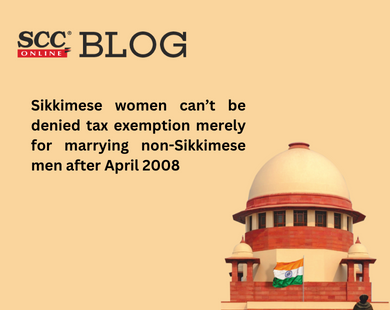Supreme Court: In a big win for Sikkimese, the bench of MR Shah and BV Nagarathna, JJ has held that:
- The exclusion of Old Indian settlers, who have permanently settled in Sikkim prior to merger of Sikkim with India on 26.04.1975 from the definition of “Sikkimese” in Section 10(26AAA) of the Income Tax Act, 1961 is unconstitutional and hence struck down. Consequently, all Indians/old Indian settlers, who have permanently settled in Sikkim prior to the merger of Sikkim with India on 26.04.1975, irrespective of whether his/her name is recorded in the register maintained under the Sikkim Subjects Regulations, 1961 read with Sikkim Subject Rules, 1961 or not, are entitled to the exemption under Section 10(26AAA) of the Income Tax Act.
- Exclusion of “a Sikkimese woman, who marries a non-Sikkimese after 01.04.2008” from exempted category as per the proviso to Section 10(26AAA) of the 1961 Act is without any reasonable justification and hence, struck down for being unconstitutional.
While the judgment was authored by MR Shah, J, Nagarathna, J wrote a detailed concurring opinion, assigning additional reasons and directions to the Union of India.
The ruling came after the writ petitioners successfully argued before the Court that by excluding the Indians from the definition of Sikkimese, the exemption granted under Section 10(26AAA) of the Act 1961, is not available to the Indian Settlers resulting in discrimination. There is no valid ground for discriminating against this section of the residents of Sikkim alone. Further, the Proviso to Section 10(26AAA), insofar as it excludes from the exempted category, “Sikkimese women” who marries a non-Sikkimese after 01.04.2008, is discriminatory and violative of Articles 14, 15 and 21 of the Constitution of India as the exclusion is based on gender. It was submitted that a woman is not a chattel and has an identity of her own, and the mere factum of being married ought not to take away that identity.
Issues
- Indians, who have settled in Sikkim prior to the merger of Sikkim with India on 26.04.1975, whether “Sikkimese” as per the definition under Section 10(26AAA)
- Constitutionality of exclusion of “a Sikkimese woman, who marries a non-Sikkimese after 01.04.2008” from exempted category as per the proviso to Section 10(26AAA) of the 1961 Act
Issue 1: Indians, who have settled in Sikkim prior to the merger of Sikkim with India on 26.04.1975, whether “Sikkimese” as per the definition under Section 10(26AAA)?
Issue 2: Exclusion of “a Sikkimese woman, who marries a non-Sikkimese after 01.04.2008” from exempted category as per the proviso to Section 10(26AAA) of the 1961 Act
The Court observed that there is no justification shown and/or demonstrated to exclude “a Sikkimese woman, who marries a non-Sikkimese after 01.04.2008” from the exempted category and is, hence, hit by Articles 14, 15 and 21 of the Constitution of India.
Noting that there is no disqualification for a Sikkim man, who marries a non-Sikkimese after 01.04.2008, the Court observed that the discrimination is based on gender, which is wholly violative of Articles 14, 15 and 21 of the Constitution of India. The Court accepted the submission that a woman is not a chattel and has an identity of her own, and the mere factum of being married ought not to take away that identity.
On the cut-off date of 01.04.2008, the Court held that when a Sikkimese woman, who has married a non-Sikkimese prior to 01.04.2008 is entitled to the benefit of exemption provided under Section 10(26AAA), there is no justification shown to fix the cut off date of 01.04.2008. There is no rational nexus to the object sought to be achieved by excluding “a Sikkimese woman, who marries a non-Sikkimese after 01.04.2008” and to include “a Sikkimese woman, who has married a non-Sikkimese before 01.04.2008”.
Therefore, it was held that to deny the benefit of exemption under Section 10(26AAA) of the Income Tax Act to “a Sikkimese woman, who marries a non-Sikkimese after 01.04.2008” is arbitrary, discriminatory and violative of Article 14 of the Constitution of India. Hence, the Proviso to Section 10(26AAA) insofar as it excludes from the exempted category “a Sikkimese woman, who marries a non-Sikkimese after 01.04.2008” has to be struck down.
Nagarathna, J’s additional reasons and directions
The expression “an individual” in the Explanation to Section 10 (26AAA) of the I.T. Act, 1961, must include all genders including Sikkimese women. There cannot be a discrimination only on the ground of sex and race.
When a benefit is being given to a Sikkimese individual which would include all genders under the provision, by way of the Explanation being added, which is in the nature of a definition, the proviso cannot exclude a certain category of married Sikkimese women from the said Explanation and thereby, deprive them of the said benefit of exemption from payment of income tax on the basis of to whom they are married to. When the Explanation refers to an “individual”, it includes both Sikkimese men and women, in fact, all genders; it cannot have a restrictive or myopic reference to only Sikkimese men and exclude those Sikkimese women covered under the proviso. A proviso cannot over arch a provision.
[Association of Old Settlers of Sikkim v. Union of India, 2023 SCC OnLine SC 38, decided on 13.01.2023]
Judgment Authored by: Justice MR Shah
Concurrent opinion by: Justice BV Nagarathna
Justice BV Nagarathna: Igniting hope for the first ever woman Chief Justice of India
For Writ Petitioners: Senior Advocate K.V. Viswanathan, Advocate Pooja Dhar
For Revenue: ASG N. Venkataraman
For State of Sikkim: AG Vivek Kohli






